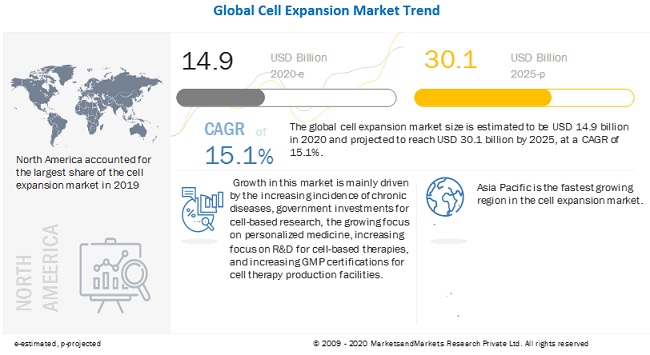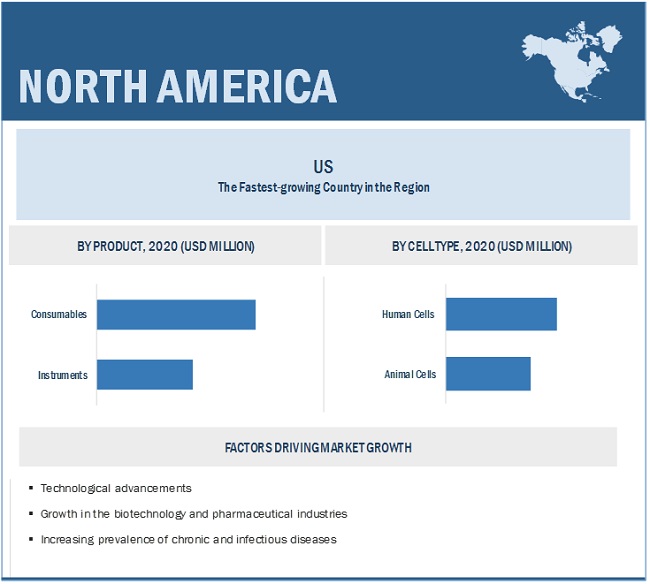Growth in this market is driven mainly by the increasing incidence of chronic diseases, government investments for cell-based research, the growing focus on personalized medicine, increasing focus on R&D for cell-based therapies, and growing GMP certifications for cell therapy production facilities.
The global cell expansion market size is estimated to be USD 14.9 billion in 2020 and projected to reach USD 30.1 billion by 2025, at a CAGR of 15.1%.

Cell expansion Market Dynamics
Driver: Increasing incidence of chronic diseases
Cell expansion is used in the R&D of drugs for the treatment of diseases. It is used in the production of vaccines, drugs, therapeutics, and antibiotics. The rising incidence of diseases such as diabetes and cancer has created a need for extensive research to develop new treatment options. According to the International Diabetes Federation (IDF), approximately 425 million people had diabetes in 2017, and this number is estimated to reach 629 million by 2045. Cancer, which has become the leading cause of death globally, accounted for 9.6 million deaths in 2018. According to GLOBOCAN, the number of cancer cases will rise to approximately 30 million by 2040 from 18 million in 2018. The growth in the prevalence of these diseases has resulted in a need to conduct extensive research for their diagnosis and treatment; cell expansion forms an important part of this research.
Download a PDF Brochure @ https://www.marketsandmarkets.com/pdfdownloadNew.asp?id=194978883
Restraint: Ethical concerns regarding research in cell biology
Research in cell biology necessitates the use of animals and humans, as animal and human cells are used in gene therapy studies that involve the recombination of genes and stem cell research therapies. These cells are also used for in vivo toxicity and pharmacokinetic testing of drugs, which may harm animals and humans. In addition, stem cell research studies use human embryos for clinical applications that often lead to the destruction of human embryos. To monitor these activities, strict regulations have been formulated by ethical authorities in various countries across the globe. Authorities such as the Human Tissue Authority (HTA), Human Fertilization and Embryology Authority (HFEA), Medicines and Healthcare products Regulatory Agency (MHRA), and Central Ethics Committee for Stem Cell Research (ZES), among others, have implemented stringent regulations for cell biology research. These ethical concerns and restrictions on the use of cells for research are limiting cell biology research to a great extent in various countries across the globe. This, in turn, is expected to restrict the growth of the cell expansion market.
Opportunity: Emerging markets
The emerging markets are expected to become a focal point for the growth of the cell expansion market. In the last few years, the biotechnology and pharmaceutical industries in countries such as India, Brazil, and China have grown significantly, and this trend is expected to continue during the forecast period. According to India Brand Equity Foundation (IBEF), the biotechnology industry in India is projected to reach USD 100 billion by 2025 from USD 11 billion in 2016, at a growth rate of 30.46%. According to the same source, the pharmaceutical industry in India is projected to reach USD 55 billion by 2020 from USD 36.7 billion in 2016. In Brazil, the pharmaceuticals market is expected to reach USD 29.9 billion by 2021 from USD 25.3 billion in 2016 (Source: Advantage Business Marketing). Growth in the biotechnology and pharmaceutical industries in these countries is expected to increase the demand for cell expansion products for R&D and the production of pharmaceutical products.
Request a Sample Pages @ https://www.marketsandmarkets.com/requestsampleNew.asp?id=194978883
North America accounted for the largest share of the cell expansion market in 2019.

North America accounted for the largest share of the cell expansion market in 2019. The large share of this segment can primarily be attributed to the rising incidence of cancer, increasing government funding, rising research activates on stem cell therapies, growing awareness regarding advanced treatment methods, growing geriatric population, and the strong presence of industry players in the region.
Key Players
The global cell expansion market is dominated by a few globally established players such as Thermo Fisher Scientific (US), Danaher (US), Becton, Dickinson and Company (US), Lonza (Switzerland), Corning (US). Merck (Germany), Miltenyi Biotec (Germany), STEMCELL Technologies Inc. (Canada), Sartorius Stedim Biotech (France), and Terumo (Japan). Start-up companies include REPROCELL (Japan), iXCells Biotechnologies (US), Neuromics (US), G&G technologies (US), and Celltainer Biotech (Netherlands).
Read More @ https://www.marketsandmarkets.com/PressReleases/cell-expansion.asp

